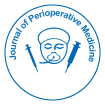
Journal of Perioperative Medicine
Open Access
ISSN: 2684-1290

ISSN: 2684-1290
Opinion Article - (2023)Volume 6, Issue 6
Indeed, surgery has undergone remarkable advancements since its inception, and the integration of technology, refined techniques, and the development of perioperative medicine has been instrumental in improving patient care. Perioperative medicine, a relatively new field, plays a significant role in ensuring the well-being of patients before, during, and after surgery. This article explores the vital role of perioperative medicine in enhancing surgical care, highlighting its impact on patient safety, optimizing outcomes, and reducing healthcare costs.
The perioperative period: A critical phase
The perioperative period, often referred to as the "surgical journey," encompasses the time from the moment a surgical procedure is considered until the patient has fully recovered. It consists of three main phases: Preoperative, intraoperative, and postoperative. Each phase presents unique challenges and opportunities for improving patient care.
Preoperative phase
The preoperative phase is the initial stage of the surgical journey. It involves a comprehensive assessment of the patient's health, identification of risk factors, and optimization of their condition. Perioperative medicine specialists, such as anesthesiologists and internists, play a pivotal role in this phase.
Risk assessment: Perioperative medicine professionals evaluate the patient's medical history, perform physical examinations, and order necessary tests to identify and mitigate potential risks. This allows for personalized care plans that address specific patient needs.
Optimization: When patients have underlying medical conditions, perioperative specialists work to optimize their health before surgery. This may involve medication adjustments, lifestyle modifications, or even delaying surgery when necessary to reduce risks.
Shared decision-making: Perioperative specialists engage in in shared decision-making with patients, discussing the benefits, risks, and alternatives to surgery, allowing patients to make informed choices.
Intraoperative phase
The intraoperative phase involves the actual surgical procedure and immediate postoperative care. While surgeons lead this phase, the collaboration with perioperative medicine specialists is critical for patient safety and well-being.
Anesthesia management: Anesthesiologists are responsible for administering anesthesia and closely monitoring patients throughout surgery. Their expertise in pain management and physiology ensures patients are comfortable and stable during the procedure.
Monitoring: Perioperative medicine specialists continually monitor vital signs, blood loss, and other critical parameters to detect and respond to any complications promptly.
Postoperative phase
The postoperative phase begins once the patient leaves the operating room and extends through their recovery. Perioperative medicine specialists continue to be involved in this phase, helping to manage pain, prevent complications, and expedite recovery.
Pain management: Effective pain management is essential for patient comfort and recovery. Perioperative specialists collaborate with the surgical team to develop pain management plans, reducing the risk of chronic pain and complications.
Complication prevention: Perioperative medicine specialists are vigilant for postoperative complications such as infections, bleeding, or organ dysfunction. Early recognition and intervention are crucial in preventing adverse outcomes.
Recovery optimization: The perioperative care is not only to ensure the patient survives surgery but also to promote a swift and complete recovery. This involves physical therapy, nutritional support, and psychological care when necessary.
Enhancing patient safety and outcomes
The integration of perioperative medicine into the surgical journey significantly enhances patient safety and outcomes. Here are some key ways in which this field contributes to better surgical care:
Risk reduction: By identifying and mitigating preexisting medical conditions and optimizing patient health before surgery, perioperative medicine reduces the risk of complications during and after the procedure.
Personalized care: Every patient is unique, and their healthcare needs vary. Perioperative specialists offer personalized care plans that address individual risk factors and preferences, resulting in better outcomes.
Multidisciplinary collaboration: Collaboration among surgeons, anesthesiologists, internists, and other healthcare professionals ensures a comprehensive approach to surgical care. This multidisciplinary teamwork promotes better decisionmaking and patient management.
Early intervention: Continuous monitoring during surgery and in the postoperative phase allows for the early detection of complications. Prompt intervention can prevent complications from becoming life-threatening or causing long-term harm.
Patient-centered care: Perioperative medicine emphasizes patient-centered care, involving patients in decision-making, and addressing their concerns and preferences. This approach fosters trust and improves patient satisfaction.
Reducing healthcare costs
In addition to improving patient outcomes, perioperative medicine also contributes to cost savings within the healthcare system. While it may seem counterintuitive, investing in perioperative care can lead to substantial financial benefits in the long run. Here's how:
Reduced complications: By minimizing the occurrence of surgical complications, perioperative medicine helps avoid costly treatments and hospital readmissions.
Shortened hospital stays: Optimized care plans and early interventions often result in shorter hospital stays, reducing the overall cost of care.
Improved resource allocation: A proactive approach to patient care allows healthcare facilities to allocate resources more efficiently, reducing the strain on staff and infrastructure.
Preventive care: Perioperative specialists focus on preventive measures, which can save healthcare costs associated with managing chronic postoperative complications.
Perioperative medicine has emerged as a vital component of modern surgical care, significantly improving patient safety, outcomes, and cost-effectiveness. The comprehensive approach to the surgical journey, from preoperative risk assessment to postoperative recovery, ensures that patients receive personalized, evidence-based care. By investing in perioperative medicine, healthcare systems can achieve better results for patients while also reducing the financial burden associated with surgical complications.
Citation: Brett Doleman (2023) The Role of Perioperative Medicine in Improving Surgical Care. J Perioper Med. 6:190.
Received: 06-Nov-2023, Manuscript No. JPME-23-26751; Editor assigned: 08-Nov-2023, Pre QC No. JPME-23-26751 (PQ); Reviewed: 22-Nov-2023, QC No. JPME-23-26751; Revised: 29-Nov-2023, Manuscript No. JPME-23-26751 (R); Published: 06-Dec-2023 , DOI: 10.35248/2684-1290.23.6.190
Copyright: © 2023 Doleman B. This is an open-access article distributed under the terms of the Creative Commons Attribution License, which permits unrestricted use, distribution, and reproduction in any medium, provided the original author and source are credited.